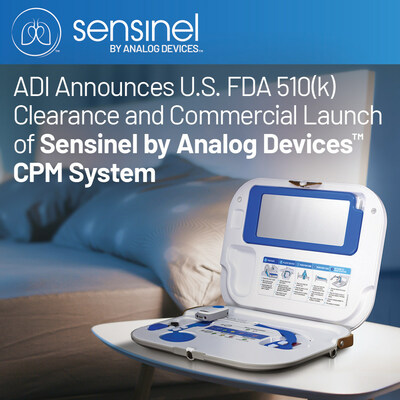ADI Announces U.S. FDA 510(k) Clearance and the Commercial Launch of Sensinel by Analog Devices™ Cardiopulmonary Management (CPM) System
- FDA clearance and commercial launch of the Sensinel™ Cardiopulmonary Management System by Analog Devices, Inc.
- The device captures cardiopulmonary measurements for chronic disease management like heart failure.
- First FDA clearance in the company's 59-year history.
- Potential to open up several billion dollars of market opportunity for ADI.
- Aims to improve patient care, streamline clinician workflows, and reduce healthcare costs.
- 6 million Americans are living with heart failure, expected to rise to 8 million by 2030.
- Heart failure costs Americans $30 billion annually, expected to rise to $70 billion by 2030.
- 80% of costs are due to hospitalization.
- Sensinel CPM System aims to provide sensitive and specific data to predict events early and avoid costly hospitalizations.
- Patients self-apply the wearable device for three to five minutes in a home care setting.
- None.
Insights
The FDA clearance of Analog Devices' Sensinel CPM System marks a significant milestone for the company, venturing into the medical device market with a product that addresses a critical need in chronic disease management. The system's non-invasive, remote monitoring capabilities could be transformative for patients with heart failure, a condition that incurs substantial costs due to frequent hospitalizations. The ability to monitor patients remotely and potentially reduce hospital admissions aligns with the broader healthcare trend towards value-based care, which emphasizes outcomes and cost-effectiveness.
By providing a non-invasive and user-friendly solution, the Sensinel CPM System could see rapid adoption among healthcare providers seeking to improve patient outcomes while controlling costs. Moreover, the device's ability to collect sensitive and specific cardiopulmonary data can facilitate early intervention, which is paramount in managing heart failure effectively. This technology not only positions ADI to capture a significant market share but also supports the shift towards proactive and preventive healthcare models.
Analog Devices' entry into the healthcare market with the Sensinel CPM System could have a substantial economic impact, given the high costs associated with heart failure management. The projected increase in heart failure prevalence and associated costs underscores the urgency for cost-effective management solutions. The Sensinel CPM System's potential to reduce hospitalization rates aligns with the need to curb the economic burden of heart failure, which is expected to escalate in the coming years.
From an economic standpoint, the adoption of such technologies could lead to a reallocation of healthcare resources, with savings from reduced hospitalizations potentially being redirected towards preventive care and other areas of need. The system's ability to enable early intervention could also translate into long-term cost savings for healthcare systems, as better-managed chronic conditions often result in lower cumulative healthcare expenses.
The commercial launch of the Sensinel CPM System by Analog Devices taps into a growing remote patient monitoring market, which has been expanding rapidly due to technological advancements and a shift towards home-based care. The system's targeted approach to cardiopulmonary disease management could give ADI a competitive edge in a market filled with more invasive or less precise alternatives.
ADI's projection of a multi-billion dollar green-field market opportunity suggests confidence in the Sensinel CPM System's differentiation and market potential. However, its success will depend on factors such as the system's integration with existing healthcare workflows, reimbursement policies and the speed of technology adoption among clinicians. The company's ability to demonstrate improved clinical outcomes and cost savings will be crucial in convincing stakeholders to invest in this new technology.
Enabling closer remote patient monitoring and reduced healthcare costs
"Since our founding, ADI has focused on accelerating breakthroughs that enrich lives through innovative products," said Patrick O'Doherty, Senior Vice President of Digital Healthcare at ADI. "By combining our wearable vital signs sensing and signal processing technology with cardiologist-inspired algorithms to precisely determine a congestive heart failure patient's daily state of health, we developed the Sensinel CPM System. This innovative service-based product has the potential to open up several billion dollars of green-field market opportunity for ADI while improving patient care, streamlining clinician workflows, and reducing healthcare cost."
More than 6 million Americans are living with heart failure today, and this number is estimated to rise to nearly 8 million by 2030.¹ Heart failure currently costs Americans approximately
The Sensinel CPM System is the next-generation solution for management of cardiopulmonary diseases like heart failure. It is equipped with a set of physiological indicators to help care teams better manage chronic conditions early and remotely, as well as in a precise manner. Patients self-apply ADI's Sensinel CPM Wearable which they only wear for three to five minutes in a home care setting. The device then captures data about their cardiopulmonary health. This data is automatically uploaded to ADI's Sensinel CPM Cloud Platform using a cellular link (without the need for a patient-supplied Internet connection) and is then further analyzed using ADI's Sensinel CPM Intelligent Algorithms in the cloud.
"Early detection of physiological changes is critical for clinicians to prevent a heart failure hospitalization," said Dr. Sean Pinney, Chief of Cardiology at Mount Sinai Morningside in
"When managing chronic conditions like heart failure, it is critical to adjust treatment early to get the condition under control without the need for hospitalization. Other existing non-invasive solutions are not specific enough to provide the data a clinician needs to be effective for early intervention," said Dr. Venu Gopinathan, ADI Fellow and Managing Director of Medical Products at ADI. "Our new cardiopulmonary system is designed to fit seamlessly into the workflow of care and perform a variety of physiological measurements that allow care teams to make early clinical decisions, without subjecting them to information overload."
ADI's Sensinel CPM System is now commercially available. For more information, visit https://sensinel.analog.com.
About Sensinel by Analog Devices™
Sensinel by Analog Devices – a brand new wearable healthcare line – aims to fundamentally transform how chronic disease is managed to promote quality of life in an affordable manner. The first product, the Sensinel CPM System, is a non-invasive, at-home solution that captures cardiopulmonary measurements for chronic disease management such as heart failure. Analog Devices, Inc., the company behind Sensinel, is a global semiconductor leader with more than 50 years of expertise in the healthcare industry, particularly within sensing, measuring, computing, connecting, and powering to accelerate human breakthroughs that enrich lives and the world.
About Analog Devices, Inc.
Analog Devices, Inc. (NASDAQ: ADI) is a global semiconductor leader that bridges the physical and digital worlds to enable breakthroughs at the Intelligent Edge. ADI combines analog, digital, and software technologies into solutions that help drive advancements in digitized factories, mobility, and digital healthcare, combat climate change, and reliably connect humans and the world. With revenue of more than
All trademarks and registered trademarks are the property of their respective owners.
Forward-Looking Statements
This press release contains forward-looking statements, which address a variety of subjects including, for example, statements regarding applications, benefits and growth opportunities related to Sensinel or other healthcare wearables; and other future events. Statements that are not historical facts, including statements about our beliefs, plans and expectations, are forward-looking statements. Such statements are based on our current expectations and are subject to a number of factors and uncertainties, which could cause actual results to differ materially from those described in the forward-looking statements. The following important factors and uncertainties, among others, could cause actual results to differ materially from those described in these forward-looking statements: the effects of business, economic, political, legal and regulatory uncertainty or conflicts upon our global operations; changes in demand for semiconductors and the related changes in demand and supply for our products; manufacturing delays, product availability and supply chain disruptions; our future liquidity, capital needs and capital expenditures; our development of technologies and research and development investments; our ability to compete successfully in the markets in which we operate; changes in our estimates of our expected tax rates based on current tax law; adverse results in litigation matters; the risk that we will be unable to retain and hire key personnel; security breaches or other cyber incidents; unanticipated difficulties or expenditures relating to integrating Maxim Integrated Products, Inc. ("Maxim"); uncertainty as to the long-term value of our common stock; and the risk that expected benefits, synergies and growth prospects of acquisitions, including those from our acquisition of Maxim, may not be fully achieved in a timely manner, or at all. For additional information about factors that could cause actual results to differ materially from those described in the forward-looking statements, please refer to our filings with the Securities and Exchange Commission, including the risk factors contained in our most recent Annual Report on Form 10-K. Forward-looking statements represent management's current expectations and are inherently uncertain. Except as required by law, we do not undertake any obligation to update forward-looking statements made by us to reflect subsequent events or circumstances.
References
1. American Heart Association. Understand your risk for heart failure. American Heart Association website. Published May 9, 2017. Updated June 13, 2023. Accessed March 5, 2024. https://www.heart.org/en/health-topics/heart-failure/causes-and-risks-for-heart-failure/understand-your-risk-for-heart-failure
CONTACT:
Ferda Millan
Global PR and External Communications
Analog Devices
Ferda.Millan@analog.com
(408) 373-1854
Michael Lucarelli
Vice President, Investor Relations and FP&A
Analog Devices
Investor.Relations@analog.com
(781) 461-3282
![]() View original content to download multimedia:https://www.prnewswire.com/news-releases/adi-announces-us-fda-510k-clearance-and-the-commercial-launch-of-sensinel-by-analog-devices-cardiopulmonary-management-cpm-system-302079376.html
View original content to download multimedia:https://www.prnewswire.com/news-releases/adi-announces-us-fda-510k-clearance-and-the-commercial-launch-of-sensinel-by-analog-devices-cardiopulmonary-management-cpm-system-302079376.html
SOURCE Analog Devices, Inc.









